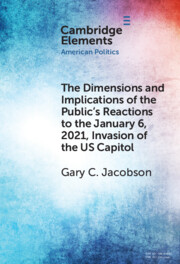Element contents
The Dimensions and Implications of the Public's Reactions to the January 6, 2021, Invasion of the U.S. Capitol
Published online by Cambridge University Press: 29 March 2024
Summary
- Type
- Element
- Information
- Series: Elements in American PoliticsOnline ISBN: 9781009495387Publisher: Cambridge University PressPrint publication: 25 April 2024



